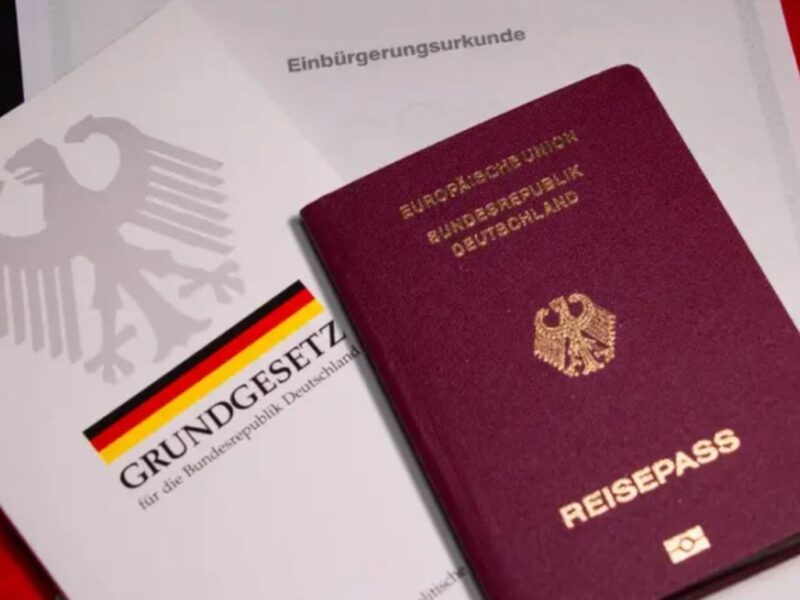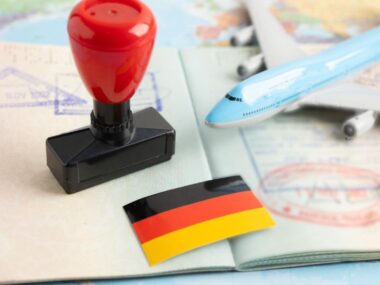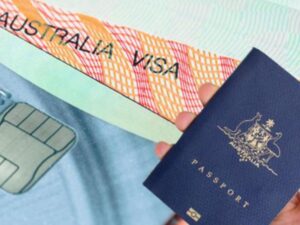Germany, with its renowned engineering prowess, rich history, and breathtaking landscapes, has captivated the imaginations of travelers worldwide. But for many, a fleeting tourist visa simply isn’t enough. The desire to call this vibrant nation home, to immerse oneself in its culture and build a fulfilling life, often burns bright.
However, navigating the German immigration system can be a daunting task. The rules and regulations are complex, and the process can be time-consuming. This comprehensive guide aims to shed light on the path to permanent residency in Germany, empowering you with the knowledge and confidence to pursue your dreams.
We’ll delve into the intricacies of converting your visitor visa, exploring the eligibility criteria, outlining the necessary steps, and offering practical tips to increase your chances of success. Whether you’re drawn to Germany’s thriving job market, its world-class education system, or the allure of a stable and prosperous European life, this guide will serve as your compass on this exciting journey.
Understanding the Permanent Residence in Germany
Germany, known for its strong economy, high quality of life, and rich culture, attracts millions of visitors each year. Many people fall in love with the country and aspire to make it their permanent home. However, the path to permanent residence is not without its hurdles.
The Basics: Visitor Visa vs. Permanent Residence
Before diving into the conversion process, it’s essential to understand the fundamental differences between a visitor visa and permanent residence:
- Visitor Visa: A temporary permit allowing you to stay in Germany for a specific period, usually for tourism or business purposes.
- Permanent Residence: A long-term permit granting you the right to live and work in Germany indefinitely.
Germany, a beacon of stability, prosperity, and cultural richness, has captivated the hearts of many who visit. Its allure often extends beyond tourism, with dreams of making it a permanent home. This guide will illuminate the path to converting that dream into reality.
What is Permanent Residence in Germany?
Permanent residence, or Niederlassungserlaubnis in German, is a legal status granting foreign nationals the unrestricted right to live and work within Germany. It’s a significant milestone in the integration process, offering privileges akin to those of German citizens.
Unlike temporary residence permits, which are subject to renewal, permanent residence offers stability and security. Holders enjoy unrestricted employment rights and the freedom to move within the Schengen Area without visa restrictions.
If you’re considering making Germany your permanent home, understanding the nuances of permanent residence is crucial. It’s advisable to explore the specific requirements based on your individual circumstances and to seek professional guidance if needed.
Eligibility Requirements for Permanent Residence in Germany
Securing permanent residency in Germany is a significant milestone, offering stability and the opportunity to fully integrate into German society. However, meeting the eligibility criteria is paramount. These requirements are designed to ensure that applicants can support themselves, contribute to the German economy, and integrate successfully. Let’s delve into the key aspects:
-
Legal Residence:
- Continuous Stay: You must have resided legally in Germany for a specific period. This generally ranges from three to five years, depending on your visa status.
- Visa Types: The type of visa you hold significantly influences the eligibility period. For example, highly-skilled professionals with an EU Blue Card may be eligible for permanent residency after a shorter period than those on general work visas.
-
Financial Independence:
- Self-Sufficiency: You must demonstrate the ability to support yourself and any dependents financially without relying on public assistance. This typically involves providing proof of income, such as employment contracts, salary slips, or business records.
- Sufficient Means: The exact amount required can vary, but you must show that you have adequate financial resources to cover living expenses, including rent, food, and healthcare.
-
Language Proficiency:
- German Language Skills: A basic command of the German language is essential. You’ll generally need to demonstrate at least B1 level proficiency according to the Common European Framework of Reference for Languages (CEFR). This can be proven through language certificates from recognized institutions.
- Integration Course: In many cases, completing an integration course is mandatory. These courses cover German language, cultural orientation, and information about the German legal and social system.
-
Health Insurance:
- Comprehensive Coverage: You must have continuous and comprehensive health insurance coverage throughout your stay in Germany. This ensures that you have access to necessary medical care without becoming a burden on the public health system.
-
Accommodation:
- Suitable Housing: You must have secure and suitable accommodation in Germany. This can be your own property, a rented apartment, or other suitable living arrangements.
-
Criminal Record:
- Clean Record: A clean criminal record is crucial. Serious criminal offenses can significantly impact your eligibility for permanent residency.
-
Integration:
- Social and Cultural Integration: Demonstrating efforts to integrate into German society is highly valued. This can include participation in community activities, volunteering, or engaging with German culture.
-
Specific Requirements for Certain Categories:
- Highly-Skilled Professionals: Those with in-demand skills or academic qualifications may have accelerated pathways to permanent residency.
- Family Members of German Citizens: Spouses or children of German citizens may have different eligibility criteria and shorter waiting periods.
Important Considerations:
- Individual Circumstances: The specific eligibility criteria can vary depending on your individual circumstances and the type of visa you hold.
- Regular Updates: Immigration laws and regulations can change. It’s crucial to stay informed about the latest updates and consult with reliable sources.
- Professional Guidance: Seeking advice from an immigration lawyer can be invaluable. They can provide personalized guidance and ensure that your application is complete and accurate.
By carefully understanding and meeting these eligibility criteria, you can increase your chances of successfully converting your visitor visa to permanent residence in Germany and embarking on a fulfilling life in this dynamic country.
Time Factor for Converting to Permanent Residency in Germany
The duration of your journey to permanent residency in Germany hinges on multiple variables. While there’s no one-size-fits-all answer, understanding the general timeline can provide valuable insights.
The Initial Stage: Visitor Visa and Temporary Residence Permit
Your sojourn in Germany begins with a visitor visa, typically valid for a short-term stay of up to 90 days. To extend your stay and progress towards permanent residency, you’ll need to acquire a temporary residence permit. The duration of this permit is contingent upon the reason for your stay.
- Employment: If you secure a skilled job in Germany, your temporary residence permit is usually tied to your employment contract. This can range from a few months to several years, depending on the nature of your work.
- Studies: Students often receive residence permits linked to their enrollment period, which can extend across multiple semesters.
- Family Reunification: For those joining family members in Germany, the duration of the initial residence permit varies based on individual circumstances and family relationships.
The Final Stage: Permanent Residency
Once you’ve established a legal basis for your stay through a temporary residence permit, the clock starts ticking towards potential permanent residency. Generally, you’ll need to accumulate a minimum of three to five years of continuous legal residence in Germany. However, this is a guideline, and specific requirements can fluctuate based on factors such as:
- Reason for Initial Stay: Different pathways to residency have varying timelines.
- Type of Temporary Residence Permit: The conditions and duration of your initial permit can influence the overall process.
- Immigration Office Workload: Administrative processing times can vary between different regions in Germany.
- Individual Circumstances: Personal factors, such as language proficiency or financial stability, may impact the pace of your application.
Key Considerations
To optimize your chances of a smooth transition to permanent residency, consider the following:
- Early Planning: Anticipate the steps involved and gather necessary documentation well in advance.
- Patience is a Virtue: The process can be lengthy, so be prepared for potential delays.
- Professional Guidance: Consider consulting an immigration lawyer for expert advice and support.
By understanding these general timelines and factors, you can better plan your journey towards permanent residency in Germany. Remember, every individual’s situation is unique, so it’s essential to stay informed and adapt to potential changes.
The Path to Permanent Residence
While the journey to permanent residency is achievable, it demands careful planning and adherence to specific regulations. The general process involves:
- Obtaining a Temporary Residence Permit: This is the initial step, requiring a legal basis for staying in Germany, such as employment, studies, or family reunification. The specific permit depends on the reason for your stay.
- Fulfilling Eligibility Criteria: To qualify for permanent residence, you must demonstrate financial independence, possess adequate health insurance, and often, have basic German language skills. A clean criminal record is also essential.
- Residency Requirement: Typically, you’ll need to reside in Germany for a specified period, usually five years, before applying for permanent residence. However, this duration can vary depending on your circumstances.
- Application and Approval: Once the residency requirement is met, you can submit an application to the local immigration office (Ausländerbehörde). The approval process involves a thorough evaluation of your application and supporting documents.
Common Pathways to Permanent Residence in Germany
Germany offers several avenues for individuals to establish permanent residency. The specific route depends largely on your personal and professional circumstances.
Employment-Based Permanent Residence
Germany’s robust economy often provides opportunities for skilled workers. Here are two primary pathways:
- Skilled Worker: Possessing in-demand skills can be a gateway to permanent residency. Securing a job offer from a German employer is typically the first step. Subsequent steps involve obtaining a work permit and meeting specific requirements related to income, employment duration, and integration into German society.
- Blue Card: Aimed at highly qualified professionals, the Blue Card is a fast-track to permanent residency. To qualify, you must hold a university degree, have a job offer with a minimum annual salary, and possess skills in high demand within the German labor market.
Self-Employment/ Entrepreneurship
Entrepreneurship can be a viable path to permanent residency. Establishing a successful business in Germany demonstrates economic contribution and integration. Key factors considered by immigration authorities include the business’s viability, financial stability, and job creation potential. Successful entrepreneurs who meet specific criteria can apply for permanent residency.
Family Reunification
Family ties often facilitate the process of obtaining permanent residency. The most common pathway is through marriage to a German citizen. Spouses of German citizens can typically apply for a residence permit, which can eventually lead to permanent residency. Additionally, family members of EU citizens enjoy certain rights to reside in Germany, which can also serve as a foundation for permanent residency.
Other Potential Pathways
While less common, there are other avenues to explore:
- Students: Graduates from German universities with specific qualifications may find opportunities to transition to permanent residency through post-study work programs. These programs often target highly skilled individuals in fields where there is a shortage of qualified workers.
- Refugees: Individuals granted refugee status in Germany may have a pathway to permanent residency after fulfilling certain conditions and residency requirements. The specific process varies depending on individual circumstances and legal changes.
It is important to note that immigration laws and regulations are subject to change. For accurate and up-to-date information tailored to your specific situation, consulting with the German immigration authorities or an immigration lawyer is strongly recommended.
Factors Influencing the Permanent Residency Application Process in Germany
The journey to securing permanent residency in Germany is influenced by several factors. Understanding these elements can help you navigate the process more effectively.
Personal Factors
- Language Proficiency: A good command of the German language often enhances your application. It demonstrates integration efforts and facilitates communication with authorities.
- Financial Stability: Demonstrating financial independence is crucial. This includes proof of income, savings, or other financial resources sufficient to support yourself and dependents without relying on public assistance.
- Health Insurance: Comprehensive health coverage is mandatory. Ensure you have a valid health insurance policy throughout the application process.
- Criminal Record: A clean criminal record is essential. Any criminal convictions can significantly hinder your application.
Residency and Employment Status
- Length of Stay: The duration of your legal residence in Germany is a key factor. Typically, you’ll need to reside in the country for a certain period (usually three to five years) before applying.
- Type of Residence Permit: The type of residence permit you hold (e.g., employment, student, family reunification) can influence the eligibility criteria and timeline.
- Employment Status: If employed, your job stability, income level, and the nature of your occupation can impact your application.
Administrative Factors
- Immigration Office Workload: Processing times can vary depending on the workload of the immigration office handling your application.
- Completeness of Application: Submitting a complete application with all required documents can expedite the process.
- Changes in Immigration Laws: Immigration regulations can change, affecting eligibility criteria and procedures.
Economic Factors
- Labor Market Demand: The demand for specific skills in the German labor market can influence eligibility criteria for employment-based residency.
- Economic Conditions: Overall economic conditions can impact job availability and, consequently, the ease of obtaining permanent residency through employment.
By understanding these factors, you can better prepare for the application process and increase your chances of a successful outcome. Remember to consult with the German immigration authorities or an immigration lawyer for personalized advice.
Challenges and Considerations
While the prospect of permanent residency in Germany is enticing, it’s essential to be aware of potential challenges and considerations:
Common Challenges
- Bureaucracy: Navigating German bureaucracy can be complex and time-consuming. Be prepared for paperwork, appointments, and potential delays.
- Language Barrier: While not always mandatory, proficiency in German can significantly ease the process. Language barriers can hinder communication and integration.
- Financial Requirements: Meeting the financial independence criteria can be challenging, especially in high-cost cities.
- Documentation: Gathering all necessary documents can be time-consuming and stressful. Ensure you have accurate and complete paperwork.
- Changes in Immigration Laws: Immigration policies can change, potentially affecting your application. Stay informed about updates.
Important Considerations
- Legal Advice: Consider consulting an immigration lawyer for guidance, especially if you face complex situations or uncertainties.
- Thorough Preparation: Plan ahead, gather all required documents, and familiarize yourself with the application process.
- Patience: The process can be lengthy. Be patient and persistent.
- Integration: Beyond the legal requirements, active participation in German society and learning about the culture can enhance your application and overall experience.
- Financial Planning: Consider the long-term financial implications of living in Germany, including housing, healthcare, and education costs.
By understanding these challenges and considerations, you can better prepare for the journey to permanent residency in Germany.
Frequently Asked Questions (FAQs)
Here are some of the questions people ask about how you can convert your visitor visa in Germany, to a permanent residence permit:
Q: Can I apply for permanent residence from outside Germany?
A: Generally, no. You must be physically present in Germany with a valid residence permit to apply for permanent residence.
Q: What happens if my financial situation changes after obtaining permanent residence?
A: If your financial situation deteriorates to the point where you can no longer support yourself, you may risk losing your permanent residence status. It’s essential to maintain financial stability.
Q: Can I travel outside Germany while my permanent residence application is being processed?
A: Yes, but it’s advisable to inform the immigration office of your travel plans. You may need to provide evidence of your return to Germany upon re-entry.
Q: What if I lose my job after obtaining permanent residence?
A: Losing your job after obtaining permanent residence doesn’t automatically lead to the revocation of your status. However, you’ll need to find new employment to maintain your financial independence.
Q: Can I change jobs after obtaining permanent residence?
A: Yes, you can change jobs after obtaining permanent residence. However, informing the immigration office of your new employment is usually recommended.
Q: What if my business fails after obtaining permanent residence?
A: If your business fails, you may need to find alternative employment to maintain your permanent residence status.
Q: Are there specific requirements for the type of business to qualify for permanent residence?
A: While there’s no strict limitation on business types, the business should be economically viable and contribute to the German economy.
Q: What if my marriage to a German citizen ends in divorce?
A: Divorce can affect your permanent residence status. The specific consequences depend on various factors, including the length of your marriage and whether you have independent grounds for staying in Germany.
Q: Can my children obtain permanent residence if I have permanent residence?
A: Yes, your children can usually obtain permanent residence if you have permanent residence. However, specific conditions and age limits may apply.
Remember, immigration laws can be complex and subject to change. It’s always advisable to consult with an immigration lawyer or the German immigration authorities for the most accurate and up-to-date information.
Conclusion
Converting a visitor visa to permanent residence in Germany is a significant endeavor that requires careful planning, patience, and adherence to specific regulations. While the dream of living and working indefinitely in Germany is attainable, it’s essential to approach the process with realistic expectations. Immigration laws and regulations can change, so it’s crucial to stay updated on the latest information. Consulting with an immigration lawyer or expert can provide valuable guidance throughout the process.







